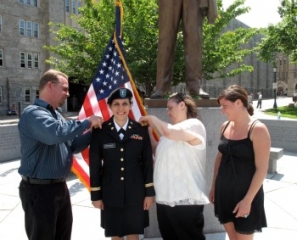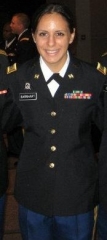This is the 25th installment in the Honored Role Series.”
Nancy Reagan once said, “I think a woman gets more if she acts feminine.” That may be true for many of aspects of life and professional endeavors but does this theory hold up in the Army?
During the last few months I read several pieces about masculinity and femininity in the workplace. Many emphasize the unique attributes and skills women and men bring to teams. Often men are associated with the traits of confidence, assertiveness, and aggressiveness, and women with collaboration, empathy, social sensitivity, and self-abnegation.
In the June 2011 issue of Harvard Business Review, a fascinating piece of research adds new information to the discussion about gender, judgment, teamwork, and group behavior. “What Makes A Team Smarter? More Women” by Professors Anita Woolley and Thomas Malone, report that the collective intelligence of work teams rise when more women are added. They found that the group’s collective intelligence has more to do with team dynamics than the sum of the individual brainpower of its members.
Contradiction
It is bit of a catch-22 for servicewomen, commented one Army colonel and psychologist. Femininity is often only associated with physicality. If a woman demonstrates confidence, assertiveness and aggressiveness and keeps her hair short, she is labeled as “too masculine” and is judged harshly and critically. Yet, the opposite is true if you take pride in your appearance and employ the traits that are naturally feminine, you are labeled as “too girly”. Women are frequently judged on their appearance prior to be evaluated on competence and intellect. It is a balancing act.
During her plebe or freshman year at West Point, Cadet Nina Barnhart broke one of the institution’s regulations—drinking alcohol during a field trip. Although 22 at the time and above the legal drinking age, West Point imposes restrictions on when and where cadets can drink. While Nina understood she had done wrong, what she was told made a lasting impression. “The officer in charge of the trip told me ‘there is a different set of standards for male and female cadets going to bars.’ That someone in a leadership position articulated a double standard of behavior based on gender did not make sense. Had I been acting inappropriately, her point many have had validity. It was counterintuitive to everything that women have been working toward for such a long time—to be seen as equal.”
The oldest of three children, Nina Barnhart, enlisted in the Army due to economic pressure. Her mother, a single mom without a college education, suffered from several health issues and had difficulty making ends meet. Although she encouraged her children to consider college, Nina knew advanced education would depend on what she could finance on her own. Scoring high on the Armed Forces Vocational Aptitude Battery, Nina had several options for military career fields and chose the Signal Corps specializing in information technology.
Arriving in Mannheim, Germany, Private Second Class Nina Barnhart was assigned to the 2nd Signal Brigade. As an information systems manager, she and her fellow soldiers were responsible for building and maintaining the technology infrastructure. Regularly she traveled through Germany helping units set up networks for battlefield simulation exercises. Tasked with a set of objectives by her NCOs, Nina was self-directed on reaching them. Barnhart explained, “This opportunity and experience remains at the forefront of my leadership development. It demonstrated confidence and respect in my ability not my rank, something I apply to others.” Her performance earned her several advancements including promotion to the grade of Sergeant, E-5, ahead of most of her peers.
Although unsure of a career in the Army Nina wanted to attend college and had begun working on a bachelor’s degree. As a young soldier she experienced both positive and negative leadership examples. She wanted to be a leader who others looked up to. A captain suggested she consider West Point. When Nina learned about the nation’s preeminent leadership school she decided to apply and was accepted.
Looking good
Reflecting back on the lessons she learned as a cadet, five years later and now an officer, Nina is vocal about double standards in behavior and looks.
In any professional capacity it behooves one to look their best. When is looking good, bad?
It is a great combination to be powerful, confident and look feminine. What is not okay is to look overtly sexy and provocative. Knowing that you look your best and are competent is empowering. Finding the sweet spot is what many struggle with particularly in the military, given a daily duty uniform that designed for functionality not for flattery.
Certainly movies such as Officer and a Gentleman, A Few Good Men and Top Gun, depict military men in uniform as powerful, confident, masculine and frankly handsome.
Commissioned a second lieutenant in the Finance Corps in May 2011, Nina believes an attitude and a stereotype exist in the Army that if a woman in uniform looks and acts feminine she is perceived less capable of doing her job. She explained,
“There are so many stereotypes that if a soldier wears make up, has a stylish haircut, or dresses smartly and sharply in and out of uniform she is using her femininity to ‘get ahead’. Gender is not a factor in ability to do one’s job. Just as Solider has no gender.”
Standards of Appearance
Recently the Sergeant Major of the Army, Raymond Chandler, announced Army grooming standards will be revised. “I believe that we can better visualize to the American people and the Army what it means to be an American soldier than we’re doing now,” Chandler told Army Times. “This can be done through personal grooming standards and standards of appearance.” Hot topics include haircuts, French-tipped fingernails, earrings with the Army Combat Uniform and whether soldiers should be allowed to use cell phones while walking or have visible tattoos on their hands and neck. Seeking input from soldiers, Sgt. Maj. Chandler received more than 1250 responses to his request on Facebook.
Most soldiers understand that once you put on a uniform you are a known professional and a walking public relations billboard. But should women look like men?
Reviewing the comments, the majority of responders intimated that male standards for grooming are more important, valuable and appropriate and women should have the same hair and makeup standards. Others noted that if a woman decides to be a soldier she should not care about how she looks. Is this realistic?
Femininity, Nina described, is frequently associated with looks and emotions more than traits and performance outcomes. “I do wear makeup and nail polish (sometimes), and like to look professional or “pretty” as some might say. However, my makeup is always in neutral colors, as are my nails. I don’t think regulations should prohibit women soldiers from being feminine. Being in the Army should not mean females should look like males.” She continued, “The Army’s emphasis on looking professional generally imitates civilian society’s ideals, but is a more conservative version. I don’t think female soldiers should wear bright red nail polish or heavy makeup. It doesn’t look professional in business or in the military. Being feminine does not equal weakness, laziness, an inability to do the job, or the expectation someone else will do their job. These are all things I heard as enlisted and while at West Point.”
In her new unit in Fort Drum, New York, Lieutenant Barnhart’s focus is becoming a strong leader that others want to follow and ensuring the standards that she sets and demonstrate apply equally. This involves getting to know her soldiers professionally and personally, setting clear expectations, giving them opportunities to demonstrate their competency and helping others, and continuing to develop and demonstrate her financial management skills–all while in uniform and looking like the professional officer she is.
For anyone, when is looking good, bad?


Good article, Donna. The thing is, this issue has been ongoing for far too long. No greater equality is the fact that women and men in uniform are shedding blood and dying either on the battlefields or through IEDs in Iraq and Afghanistan. The chauvinism that continues is a denial of battlefield reality.
I saw your write up on Nina Barnhart. I have known her for a very long time. I was at Grafenwoehr when they were trying to fix networks and sending out the then PFC Barnhart out to fix network problems that the E-6s and E-7s just couldn’t seem to solve. I saw her books about Woops that she was reading during her down time and asked her about it. I thought then she was someone who would be a great member of the”long grey line”. When she came in one night (we were on night shift together) and told me that she had gone out during the day and ran the Army 10K qualifier, I knew that she was a prime candidate and told her that if she wanted an O-6 recommendation letter that I would give her one for USMAPS. I went to see her graduate at USMAPS the next year. Sorry that I never made it up to Woops when she was there so I never saw her there. You picked a “good one” to write about. She is going places.
Nina: Every time I turn around, you are just getting further and further ahead in this world. You have put a lot of hard work into getting where you are. This was just awesome to read about. You are a strong woman and a great leader. And also very, very feminine!
Nancy Reagan once said, “I think a woman gets more if she acts feminine.”Donna, what a nice forum you have to speak out and share views as a West Pointer and former Army Officer. I can claim the same credentials which is why I am puzzled. Why are you quoting Nancy Reagan? How is she a role model to women in uniform? I don’t even understand her quote. A women gets more of what? Sex? and where is that definition of “acting feminine”. Discussions that dance around sexism are of what value? I’m glad you found a great woman Officer to write about. But, to also comment on her looks and grooming. WHY. I would say that you have diminished her capacity to lead by drawing such attention to this 2nd LT in this manner. I am a women, an ’85 USMA grad and a former Army Captain. I, for one, am sick of this topic. And, I am sick of women talking about this topic. Meet regulations for behavior and dress code and do your job. That’s what women who are lucky and healthy and hardworking do.